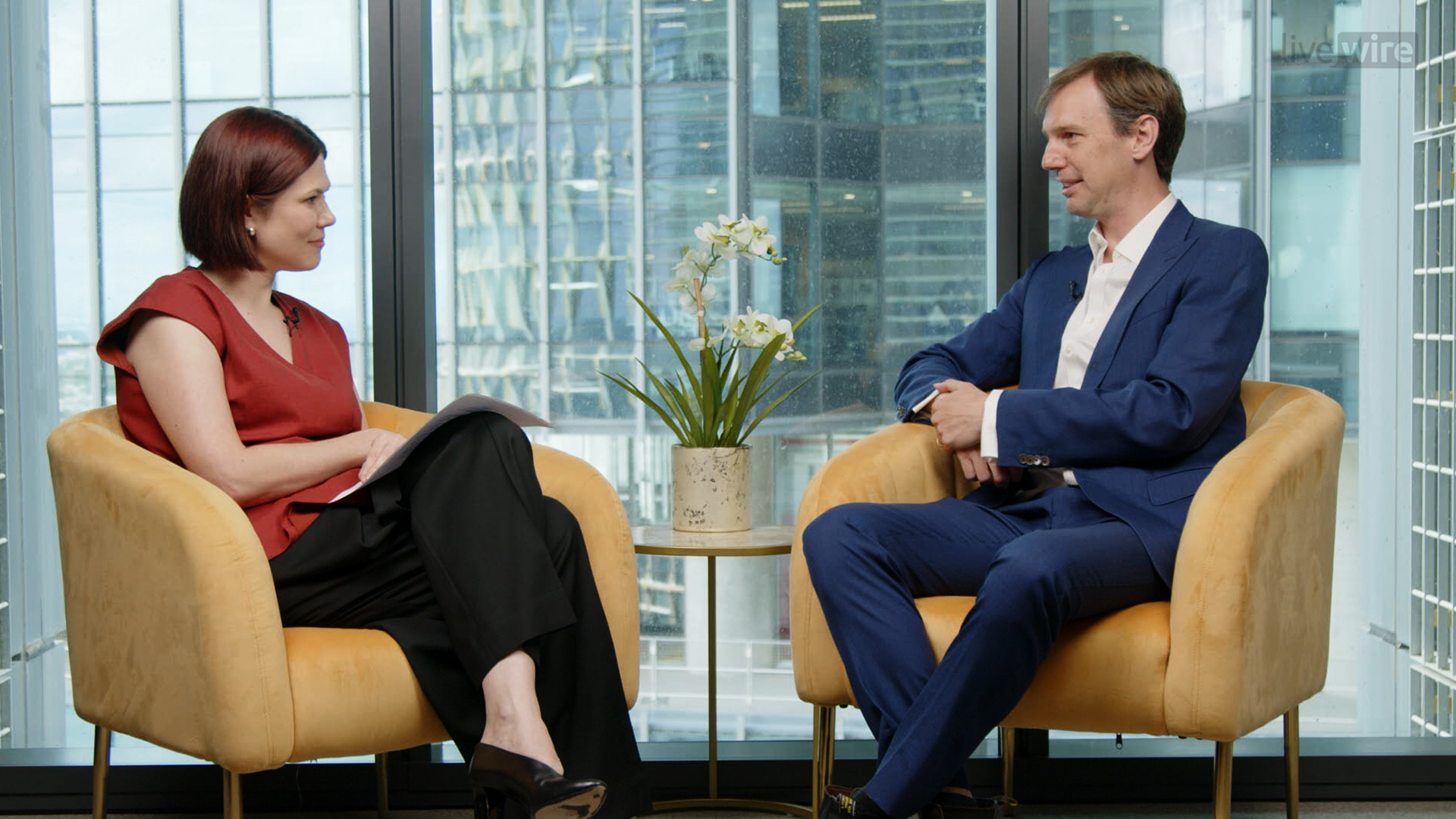250 vs 8000: I know where I'd rather be fishing
Please note this interview was filmed Thursday 30 October, 2025.
I recently sat with James Rodda, portfolio manager of the Antipodes Global SMID Fund, who discussed the benefits of investing in global small and mid-cap (SMID) stocks. It got me thinking: how does the global opportunity compare to the ASX SMID space?
In terms of size, there is no comparison. Using a market cap range of $300 million to $10 billion to cover both smalls and mids, there are approximately 250 companies on the ASX that fall into this category.
Globally, there are 8000.
With that staggeringly higher figure comes all the benefits (and challenges) you might expect—greater diversity, and broader thematic and sector breadth. All of that, in turn, equals more choice. Therefore, the bigger pool requires greater research and discernment to sort the wheat from the chaff.
In the interview above, Rodda shares his process for doing exactly that, along with the key themes, opportunities and risks he’s watching right now, and a couple of stock picks for good measure.

Why now for global SMIDs?
Rodda points to several tailwinds creating opportunities for investors willing to look beyond the usual names to uncover growth and value in less crowded corners of the market.
A softer US dollar is relieving pressure on emerging markets, especially those with US dollar–denominated debt. Meanwhile, inflation has normalised in many regions but fiscal expansion could stir it up again, creating winners and losers in the process.
“There’s a lot of beneficiaries actually of inflation, and the small mid-cap index is more diverse in terms of having exposure to those companies that can benefit,” he explains.
For investors, the global small and mid-cap universe means being able to invest across all industries, all countries, and capture any form of change that's going on in the world.
“It’s worth noting that currently we're trading at a record discount to large caps,” Rodda explains. “So the opportunity versus Australia is more diversity, more ideas - but versus large caps, there's a record valuation discount at the moment.”
He also points to the opportunity that lies in volatility:
“Stocks can move up quite quickly without much changing,” he says. “It happens more often, and that reduces your expected returns - that’s using volatility to your advantage to exit. Likewise, stocks often fall 20–30% for no good reason. That just happens much more frequently, and they’re buying opportunities because your expected return goes up.”
A pragmatic approach to uncovering opportunity
Antipodes’ global SMID strategy takes what Rodda calls a “pragmatic value approach”, anchored in industry-level research.
“We’ll buy companies from mature, slow-growth through to faster growth, as long as there’s a discount to our assessed valuation,” he says. “It means we understand change. A differentiator for us is that we look everywhere - globally, across all industries - and then we zero in on that change that’s under-appreciated.”
That means avoiding the obvious trends and chasing areas where the market has either overreacted or isn’t paying attention yet.
Since its launch three years ago, the fund has captured 50% of market downside and over 100% of the upside, a result Rodda attributes to this discipline.
“When you focus on that change and do the industry research to see all the disruption or where a cycle is going to play out, you significantly reduce your risk,” he says.
Where the opportunities are now
Rodda sees potential across all sectors but notes the following three as industries that are under-appreciated.
“Property is a great one at the moment, particularly in those assets not held in REIT structures,” he explains. “We’re looking at cap rates in excess of 15%. In private markets, these assets would trade at significantly tighter yields.”
In defence, he highlights smaller European companies that have quietly built technological leadership within the supply chain and are now benefiting from rising government spend.
And in software, while many smaller names have struggled amid the AI hype cycle, he believes there’s room for reversal.
“Most small mid-cap software companies have been particularly bad investments over the last 12 months,” Rodda says. “We think several names will make that transition from AI loser to AI winner, and that’s particularly exciting.”
Inside Antipodes’ Global SMIDS portfolio
Rodda lists two examples that stand out.
The first is Brookdale (NYSE: BKD), a US senior living provider, represents both deep value and demographic tailwinds.
“It’s the third-largest player. The per-bed valuation we’re paying is well under half that of comparable REITs,” Rodda explains. “Demographics are the change story. That baby boomer population hitting the age of 80 is really the catalyst for a demand cycle.”
If Brookdale simply re-rates to replacement value, he says, investors could potentially triple their money.
The second example sits in the offshore energy space.
“Most oil growth over the last decade has come from US shale,” he says. “We think shale has kind of hit a plateau. The most obvious place for new supply is deepwater offshore exploration.”
After years of underinvestment, rig supply has shrunk and utilisation is expected to hit 90% next year.
“We’re buying Valaris (NASDAQ: VAL) at around $250 million per rig. Replacement cost is about a billion dollars, and there’s no shipyard capacity. You could have a long cycle of profitability,” Rodda says.
When to sell
While Antipodes is active in managing positions, decisions to exit or trim come down to simple maths. “We exit and trim stocks for one reason - our expected return moves lower than other opportunities,” Rodda says.
That’s what led them to sell Flutter (NYSE: FLUT), a long-held sports betting position.
“Unregulated exchanges are coming in and competing, offering consumers better prices and better products,” he explains. “That was structural change, and confidence in that industry growth story decreased.”
They also rotated out of a Philippines real estate stock, Ayala Land (PSE: ALI), after a quick 30% gain.
“We bought it, it went up quickly, and we rotated our money into better opportunities with higher return,” Rodda says.
Bringing the strategy to market
The Antipodes Global SMID Fund has now been launched as an active ETF under the ticker MIDS. The decision, Rodda says, came down to investor demand and accessibility.
“Most Australian investors won’t access global markets like they can Australian markets,” he says. “You can now buy a portfolio of 60 stocks that’s quite diversified, exposed to small mid-cap companies, on the ASX. I think that’s compelling.”
Risks and the road ahead
“Volatility is always great for active management,” Rodda says of the year ahead. “The big picture opportunity is fantastic, with that record discount to large caps.”
He does flag risks such as weaker US consumer spending, government overspending, and the potential return of inflation if deficits aren’t reined in. But for long-term investors, he believes those events could create more opportunity than risk.
“If you’re investing for the long term, those selloffs present opportunities to redeploy into things that have been hit hardest by whatever the perceived risk is,” he says.
Broader universe. Greater opportunity.
The award-winning Antipodes Global SMID Active ETF (ASX: MIDS) takes a differentiated, industry-led research investment approach. They are hunting for the best opportunities across industries and regions, building a portfolio designed to capture upside while protecting the downside. Learn more by visiting the Antipodes website.
3 topics
3 stocks mentioned
1 fund mentioned
1 contributor mentioned
.jpg)
.jpg)